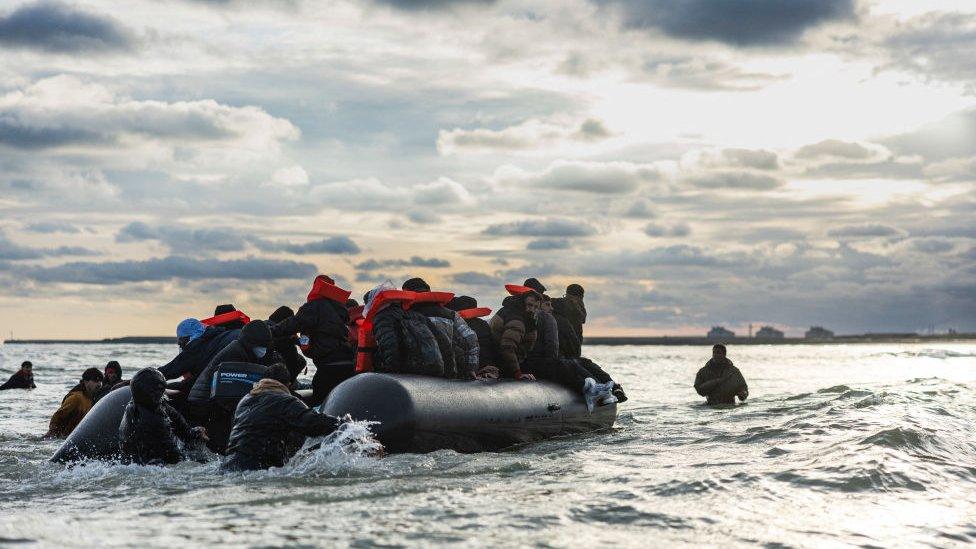Ireland to redesignate UK as 'safe' for asylum
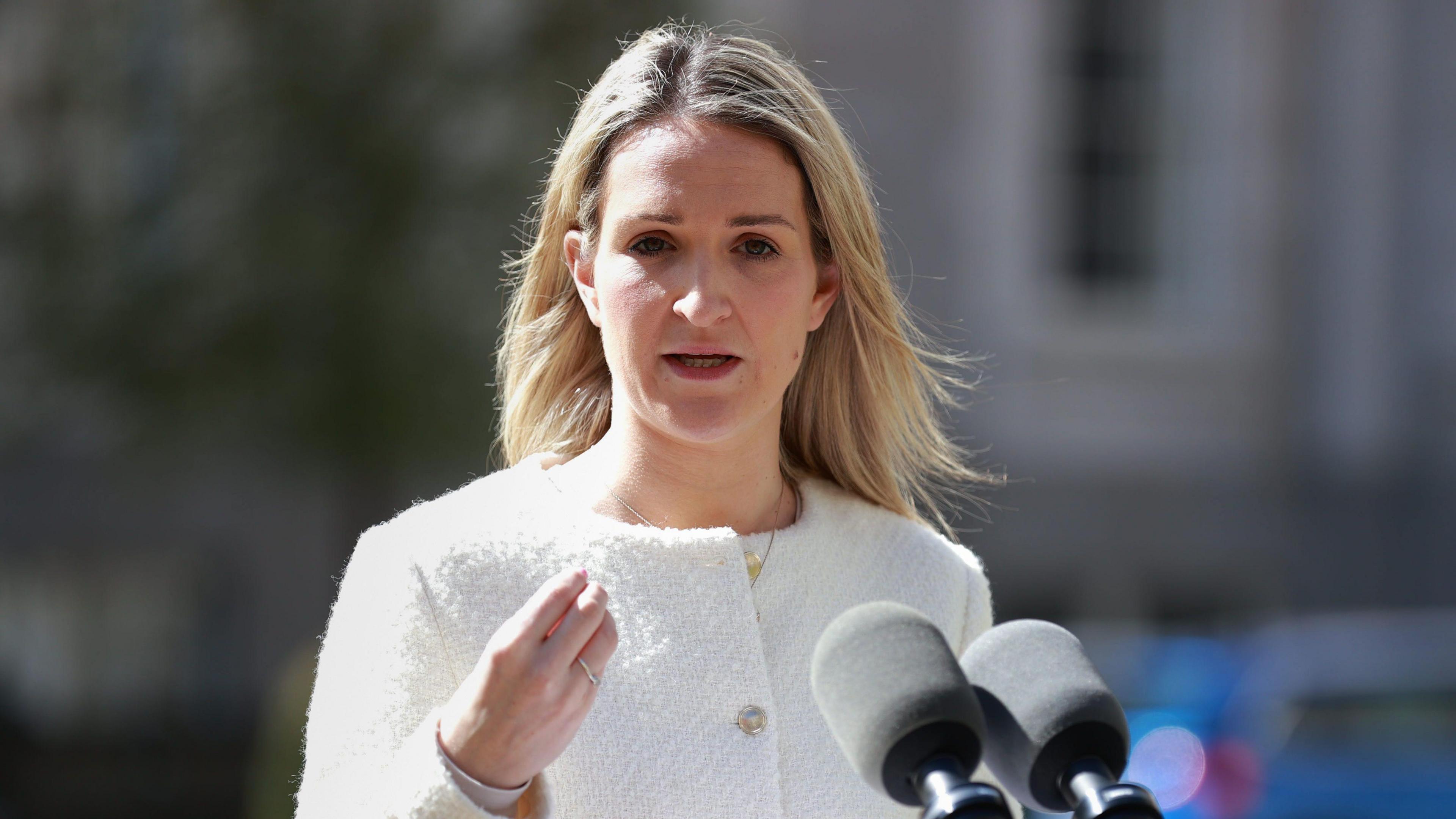
Irish Justice Minister Helen McEntee said she would close a "loophole" in Irish law
- Published
A plan to draft new Irish legislation which would redesignate the UK as a "safe country" to which asylum seekers can be returned has been approved.
Irish government ministers collectively approved the plan brought to Cabinet by Justice Minister Helen McEntee.
Last week she claimed more than 80% of recent asylum claims were from people who arrived in the state by crossing the border with Northern Ireland.
But the British government has said it will decide who it accepts into the UK.
The Irish government has recently expressed concern that the UK's plan to deport asylum seekers to Rwanda is encouraging more refugees to come to the Republic of Ireland.
Tánaiste (Irish deputy prime minister) Micheál Martin said last week that asylum seekers were seeking "sanctuary here and within the European Union as opposed to the potential of being deported to Rwanda".
On Monday, Mr Martin was asked to clarify Ms McEntee's claim that 80% of asylum seekers come to the Republic of Ireland via the land border.
He replied that it was not statistical and "not a data-based sort of evidence base" but he added it was very clear that "there's a change in the nature of where migrants have come from".
Closing a 'loophole'
The situation has been complicated by a recent Irish court ruling.
In March, the High Court in Dublin ruled that Ireland's designation of the UK as a safe third country for returning asylum seekers was contrary to EU law, external, in light of the UK's controversial Rwanda policy.
On Tuesday morning, Ms McEntee brought her proposal to the Irish Cabinet in a bid to close the "loophole" that has arisen as a result of the High Court judgement.
"What this will do is enable us to redesignate the UK as a safe country for the purposes of returns," she told reporters on her way into the Cabinet meeting.
Ms McEntee also explained that Republic of Ireland already had a post-Brexit agreement in place with the British government to return asylum seekers who had travelled to the Republic of Ireland from the UK.
However, she said that because of the Covid pandemic and the recent High Court ruling the return agreement “has not been effective”.
Ms McEntee said her proposed legislation would address the ruling and close the loophole.
No 'legal obligation' on UK
However, a Downing Street spokesperson appeared to contradict her claims about the extent of the post-Brexit agreement between the Irish and UK governments.
Number 10 conceded that there are “operational arrangements” between UK and Ireland but said there was “not a legal obligation to accept the return of asylum seekers".
The spokesperson also confirmed that "under those operational arrangements no asylum seekers have been returned to the UK".
They added: "It’s up to the UK government who we do and do not accept into the country.”
Tuesday's statement from Number 10 echoes recent comments from British Prime Minister Rishi Sunak, who has already said his government is "not interested" in accepting asylum seekers back from Ireland.
"We're not going to accept returns from the EU via Ireland when the EU doesn't accept returns back to France where illegal migrants are coming from," Mr Sunak told ITV.
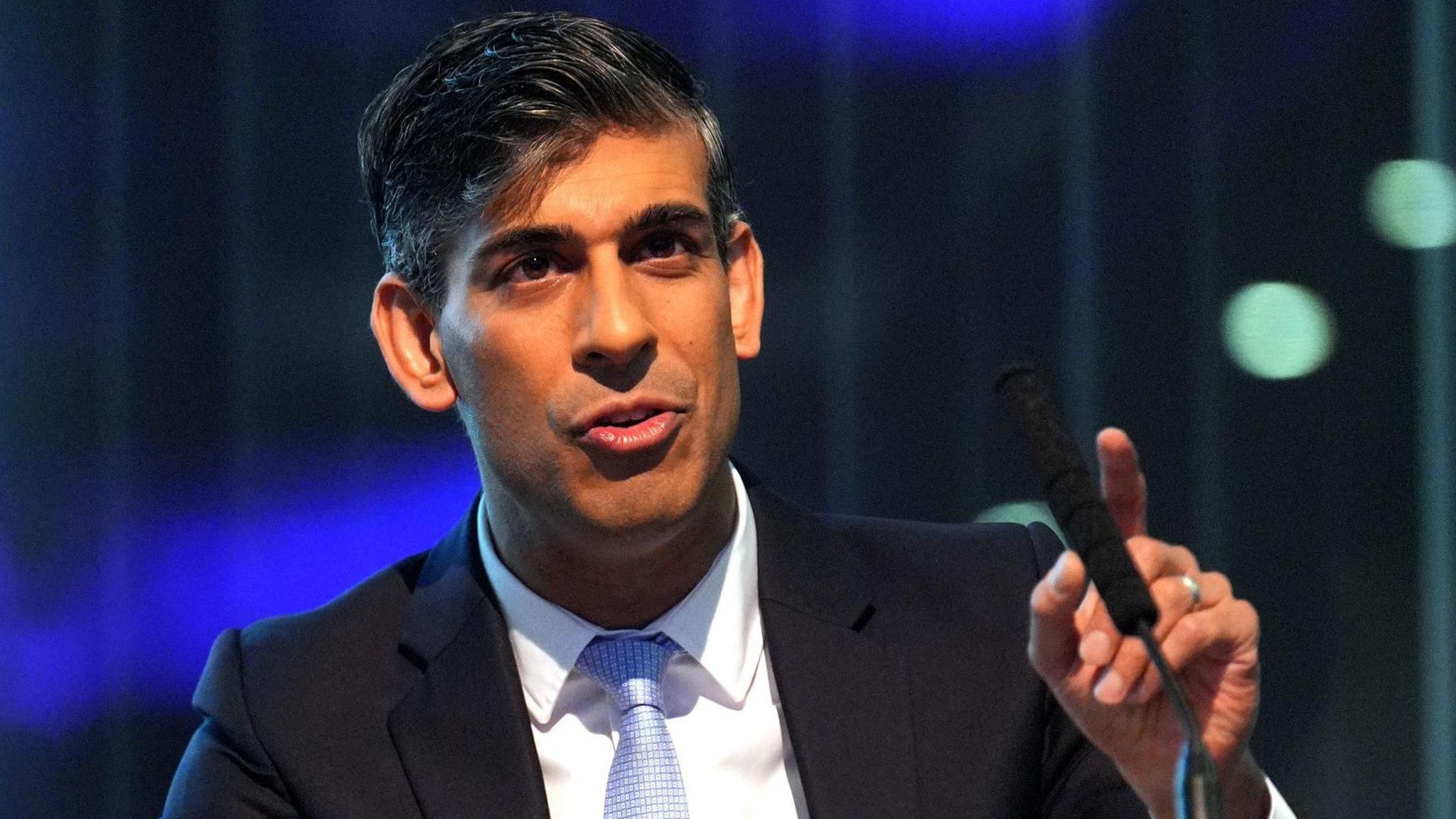
Rishi Sunak said the UK will not accept the return of asylum seekers from EU states
But speaking on Tuesday morning, Ms McEntee insisted that "despite comments that have been made, this arrangement is already in place" with the UK.
"We cannot have a loophole or a system where we cannot effectively return people," she said.
"We have been working with the UK and I look forward to continuing working with the UK to making sure that we prevent any type of abuses of the Common Travel Area.
"Irrespective of comments that have been made, it has not been made clear to me that we won’t continue to work with each other, and that’s the way that I’m operating."
What is the Common Travel Area?
The Common Travel Area (CTA) is special travel zone covering the United Kingdom; Republic of Ireland; the Isle of Man and the Channel Islands.
Under its rules, UK and Irish citizens can travel freely into each other's countries.
It also gives them special residential rights under which they can set up home and access public services in each other's states without immigration restrictions.
These free movement arrangements, in various forms, date back to the establishment of the Irish Free State in 1922.
However, CTA rights do not extend to migrants, even if they hold lawful residency in the UK or Ireland.
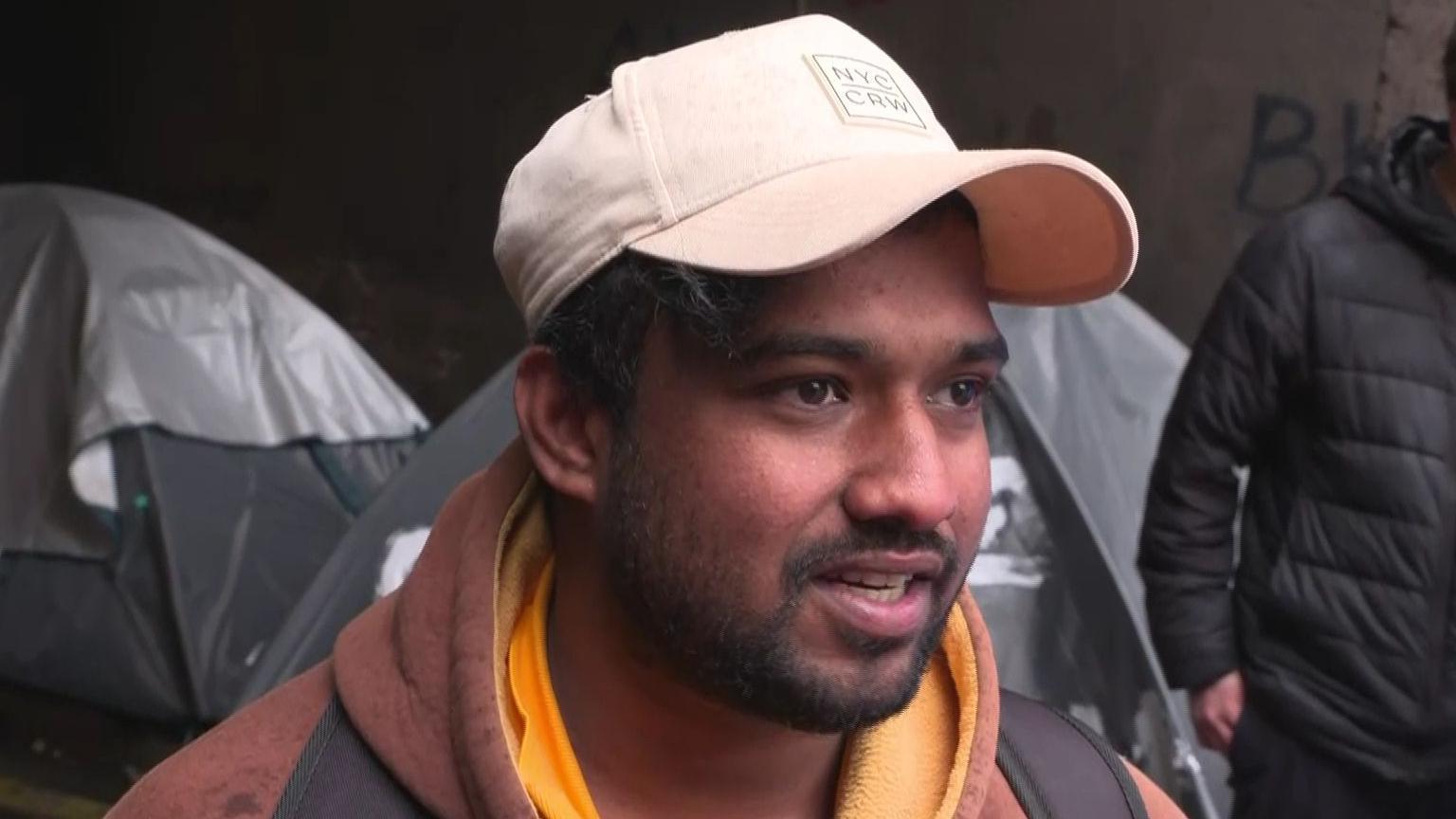
This man said he arrived from the UK via Belfast for a "better life" in Ireland
The Irish government is struggling to deal with the number of asylum seekers who have arrived in the state in recent years.
More than 1,400 applicants are currently without accommodation.
As a result, rows of tents erected by homeless refugees now line Mount Street in central Dublin.
The street is home to the International Protection Office - the building where claims for asylum (or international protection as it is known in Ireland) are examined and processed.
One 22-year-old man from India told the BBC he had arrived in the Republic of Ireland via Northern Ireland.
The man said he had been studying in the UK but his visa expired.
He said he left the UK after Brexit because “they made strict rules”.
He travelled to Northern Ireland by ferry and then got on a bus to Dublin where he now lives in a tent in the city centre.
“I came for good opportunities because there is only one life,” he said.
“If I’m honest it’s not that good because the weather is really bad and the tent is leaking but there are many good people providing us with stuff and they’re helping a lot so I’m really happy with that.”
Opposition leader Mary Lou McDonald, of Sinn Fein, accused the government of showing a level of incompetence that was “off the charts”.
She said both Ms McEntee and the tánaiste Mr Martin seemed to being making claims about people seeking asylum in Ireland “without any supporting data”.
Ms McDonald added that Mr Martin’s comments about the UK’s Rwanda policy was “a gift to the Tory party – a Tory party desperate for a row with Europe, with Ireland, with anyone on the issue of migration”.
'Open border to be protected'
Ms McEntee told reporters that the proposed legislation was just one of a number of measures she was bringing forward to ensure that Ireland's immigration system was "firm but fair."
"I have also ensured that we will release 100 Gardaí (Irish police officers) from desktop duties to make sure that they can work on immigration enforcement as well," she added.
A Garda spokesman has clarified to BBC News NI that those officers will not be assigned "to physically police the border with Northern Ireland".
"The protection of an open border on the island of Ireland was and remains a key priority to the communities on both sides of the border," he added.
He explained that some immigration administrative functions were gradually being transferred from the Garda National Immigration Bureau to the "Immigration Service Delivery function of the Department of Justice".
"This will free up to 100 Gardaí to focus on other core policing duties, which will include deportations and other aspects of immigration enforcement," he said.
- Published28 April 2024
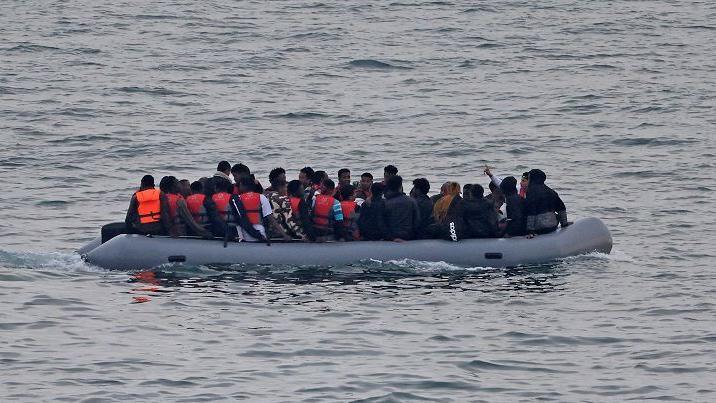
- Published29 April 2024
